Paula Vince's Blog: The Vince Review, page 13
June 21, 2023
'They do it with Mirrors' by Agatha Christie
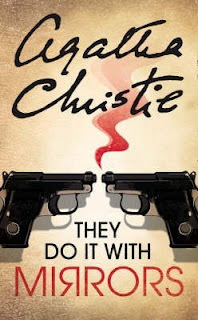
A man is shot at in a juvenile reform home – but someone else dies…
Miss Marple senses danger when she visits a friend living in a Victorian mansion which doubles as a rehabilitation centre for delinquents. Her fears are confirmed when a youth fires a revolver at the administrator, Lewis Serrocold. Neither is injured. But a mysterious visitor, Mr Gulbrandsen, is less fortunate – shot dead simultaneously in another part of the building.
Pure coincidence? Miss Marple thinks not, and vows to discover the real reason for Mr Gulbrandsen’s visit.
MY THOUGHTS:
Miss Jane Marple is tipped off that something's fishy in the household of Carrie Louise, her old school chum from way back, who has a tendency to marry intense, idealistic men. Carrie Louise's current husband, the single-minded Lewis Serracold, operates Stonygates, a reformatory school for delinquent boys that emphasises nurturing and rehabilitation. A sign posted above the door announces, 'Recover hope, ye who enter here,' the reverse of 'abandon hope' from Dante's Inferno. The guy deserves credit for trying hard.
Miss Marple goes for a long visit, and trouble erupts when the young secretary, Edgar Lawson, tries to kill Serracold in a delusional frenzy. Lawson himself is an ex-reform school boy with a persecution complex and delusions of grandeur. No sooner is potential tragedy soothed than Christian Gulbrandsen, Carrie Louise's step-son from her first marriage, is found dead in his bedroom. He's been shot.
It's revealed that Christian was trying to uncover a plot against Carrie Louise. The culprit is presumably still intent on their first murderous mission. Why anyone would want to hurt gracious and cherished Carrie Louise is baffling, especially when the suspects are narrowed down to a small circle of her nearest and dearest.
There is her grumpy and frumpy widowed daughter, Mildred; two more step-sons from Carrie Louise's second marriage, Alex and Stephen Restarick, who revere her; and her vibrant and beautiful granddaughter, Gina, recently back from America with her disgruntled young husband, Walter, in her wake. He is everyone's main scapegoat since he's new on the scene, yet the police wonder if that should, in fact, rule Walter out. Overlooking everyone is the stern but devoted 'Jolly', Carrie Louise's elderly companion who adores her.
Miss Marple really plays on her slightly doddery and disarming front. She has a warm and sympathetic way of encouraging confidence, which reinforces to her how often people make assumptions about others. Every so often she expresses gratitude for her nephew, Raymond, who supports her financially. It's lucky for the world of crime that he does. She's one of my favourite sleuths.
I love the setting of Stonygate, the shabby, genteel old mansion that's gone to seed. It's a perfect backdrop for all the action. Its dodgy electrical wiring was installed by Dr Gulbrandsen 'when electrical light was a novelty.' Gee whiz, what a landmine, when mavericks could fiddle around with a building's wiring in an era long before safety switches.
Lewis' surprising goal stands out to me too. In his line of work, he believes that transportation saved many a potential criminal. Lewis Serracold believes, 'modern and civilised conditions are too complex for some simple and undeveloped natures,' so being shipped overseas to form new lives in simpler surroundings is the making of many. His big dream is to purchase something like a group of small islands to repeat the experiment with some of his boys. It's a topsy-turvy notion that's hard for an Aussie like me to wrap my head around, having been taught from the cradle that we were merely a harsh dumping ground for our convicts, supposed desperadoes, many of whom were simply destitute and starving.
The illusional nature of the title really impresses me. It's a great read, really hard to put down, clever and satisfying. My only gripe is that toward the end, the incidental death toll rises by a few more, which seem dramatic and unnecessary. It includes some of Carrie Louise's most beloved people, yet she doesn't seem overly distraught. I guess there's no place for genuine grief to be shown in a cosy murder mystery, so we've got to assume it happens off stage. (Perhaps that explains why I find the genre awesome, but rarely 5 star material.)
Whew, I'm glad my two favourite characters have nothing to do with it.
🌟🌟🌟🌟
June 14, 2023
'The Man who was Thursday' by G. K. Chesterton
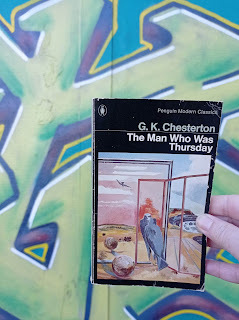
G. K. Chesterton's surreal masterpiece is a psychological thriller that centers on seven anarchists in turn-of-the-century London who call themselves by the names of the days of the week. Chesterton explores the meanings of their disguised identities in what is a fascinating mystery and, ultimately, a spellbinding allegory.
MY THOUGHTS:
A couple of years ago I read The Napoleon of Notting Hill, which just edged over my threshold for weirdness. Nevertheless, I decided to give G. K Chesterton another try by tackling this even more famous title. Wow, it's every bit as bizarre as the other, yet this one I love. Chesterton reveals himself to be a forward thinking, prophetic genius through this wacky story and I've already recommended it to several people.
It begins with Gabriel Syme, who's a poet. He's also an undercover police detective who infiltrates the deep, secret headquarters of the Central Anarchist Council. Its president is an intimidating, mysterious individual who goes by the alias, 'Sunday.' The anarchists are about to hold an election to fill a vacancy left by the death of a prior agent, 'Thursday,' and Gabriel bluffs his way into the position, eager to fight anarchy as a double agent. However, he's anxious about whether he can pull off the slick masquerade necessary to fool the dark agents of anarchy, who are now his close companions.
The secretary, 'Monday', is a menacing figure with a lopsided smile. 'Tuesday' is Gogol, a bearded, ape-like man with a strong Polish accent, and 'Wednesday' is the Marquis de Eustache, a rich and sensual aristocrat. Professor de Worms, alias 'Friday' appears spookily ancient and decrepit. And 'Saturday' is Dr Bull, a hearty young GP who insists, for some reason, on keeping his eyes covered with dark spectacles. Syme, assuming his new role as 'Thursday', aims to foil an assassination attempt across the Channel in France but fears these fellow agents of anarchy will be more than a match for him.
That's a big enough teaser. Revealing any more will risk spoiling the story, except that a predictable pattern unfolds in a most unpredictable manner, which sounds contradictory but Chesterton is master of paradox. Being the great theologian and philosopher he was, Chesterton's themes are deeper than meets the eye. For his hero, Gabriel Syme aims to overcome not just individual anarchists themselves but a problematic, poisonous, Nihilist mindset which Chesterton wished to address. He believed too many people blurred the distinction between good and evil, going so far as to consider evil good. Keep in mind, this book's publication date was 1908! (The surreal tale of London features a great ferris wheel in Earl's Court that only existed between 1895 and 1907, after which it was dismantled. It also has a speeding elephant from the London zoo.)
There is plenty of fun irony, such as Syme remarking what a tight, orderly headquarters these advocates of chaos operate, and how his own stand for respectability is actually his personal form of total rebellion, since his parents were crooks and revolutionaries. Genius one-liners keep coming too. The book's subtitle is, 'a nightmare' which Syme likens to his own adventures. At one point, he eats a delicious lobster dinner and remarks, ' It's not often a nightmare leads me to lobster. More often the other way around.'
And how about this neat insult delivered by Sunday to Saturday. 'I daresay yours is the sort of face that grows on one. In fact, it grows on you, and who am I to quarrel with the wild fruits upon the Tree of Life.'
I'll be honest, parts of this story still baffle me, but in a fascinated way. I'm sure subsequent readings will reveal more of the onion layers of this story, when I return to it down the track.
For now, I'll finish off with this abbreviated confrontation between Wednesday and Gabriel (Thursday) who, at this stage, really needed to pick a fight with him. Do you think it has shades of our own extremely touchy era?
'This man has insulted me, said Syme. 'He insulted my aunt.'
'But how can the Marquis have insulted your aunt just now? He has been sitting here the whole time.'
'Ah, it was what he said.'
'I said nothing at all,' said the Marquis, 'except something about the band. I only said that I liked to hear Wagner played well.'
'It was an allusion to my family,' said Syme firmly. 'My aunt played Wagner badly. It was a painful subject. We are always being insulted about it. The whole of your conversation was simply packed with sinister allusions to my aunt's weaknesses.'
'This is nonsense. I for one have said nothing for half an hour except that I liked the singing of the girl with black hair.'
'Well, there you are again! My aunt's hair was red.'
'It seems to me, you are simply seeking a pretext to insult the Marquis,' said the other gentleman.
'By George. What a clever chap you are.'
Do read it, if you think your own tolerance for weird, potentially mind-blowing novels may be up to the challenge.
🌟🌟🌟🌟🌟
June 7, 2023
'Pollyanna's Debt of Honour' by Harriet Lummis Smith
MY THOUGHTS:
It's the fifth Glad Book and Smith's third, first published in 1927. Pollyanna and Jimmy celebrate their tenth wedding anniversary. The house across the road from them will be lived in at last, by a father and daughter duo who wish to shun visitors, and have therefore chosen the wrong street to settle in. Times have changed. In the 21st century it's become a challenge to meet close neighbours, while in 1920s Elsinore Terrace, it was more of a challenge not to.
The young woman, Lorraine, has a scarred cheek from an accident, which leaves her bitter and self-conscious. A bit of prying from Pollyanna reveals that Lorraine had been going steady with Frank Lindsay; none other than Jimmy's work friend who had presented them with Jiggs as a pet. But that's all over now.
It turns out Lorraine thought she was getting a pity proposal from Frank, when in fact she was getting a heartfelt one. The stalemate has dragged on for years. Since the pair is still in love, it will take a slick bit of matchmaking from Pollyanna to bring them together. She considers the fulfillment of this will be her 'debt of honour' since Lorraine rescued baby Ruth from being hit by a truck. But it'll take more effort than she imagines.
Meanwhile, James (aka Jamie) Carew has written a book which is getting rave reviews and being lapped up by the public. Jamie considers it his most 'mature and thoughtful work' but to Pollyanna it is horribly risque. The heroine is an adulterous woman who tires of her husband and runs off with a new hunk instead. The question modern readers may ask is whether Pollyanna and Jimmy are being prudish by panning it. After all, the plot of James' book sounds like a knockoff of Anna Karenina, which is a timeless classic. But Pollyanna gives James a tongue-lashing, and he understandably gets defensive. An author has a right to write whatever he darn well pleases, right?
Think again. Harriet Lummis Smith crafts her own book in a way that echoes Pollyanna's point. James gets egg on his face when his beautiful young secretary, under the influence of his own deplorable main character, attempts to pull off a Lydia Bennett maneuver and run away with a seductive fellow she fancies. It seems a girl's reputation could be squelched as much in the 1920s as in the Regency Era, but the book made her do it. At least Pollyanna brings the lion's share of blame to Jamie's door. 'I hold him responsible for making respectability seem tame and cowardly and immorality romantic and beautiful.' Hmm, James has the grace to ponder her point and admit that fiction authors may hold a huge onus in shaping society, since readers everywhere are affected by the books they read.
One up for Harriet Lummis Smith and her mouthpiece, Pollyanna, although I have to say we readers are in no position to really form an opinion in this instance without at least reading Jamie's book, Growing Pains, which of course we're not able to.
Pollyanna is such a busybody though. She sets out to rescue Paula Merrill, a young woman she's met only once, from the clutches of Gerald Fox, a man who is also a stranger. Honestly, who does such audacious meddling?! Yet just when we think she's gone too far, her nosiness saves the day. So part of me wonders if we're being convinced to regard sticky-beaking and interfering as strengths. They sure seem to be in Pollyanna's case.
Here are a couple of other dated quotes that make me cringe or laugh out loud. When Pollyanna is introduced to the beautiful Paula, she says, 'It's hard to believe anyone so ornamental can be useful too,' intending it as a sweeping compliment. I can't help thinking Paula must've shown great restraint not to roll her eyes.
On another occasion Pollyanna tells Junior, 'I never had to earn my living. First Aunt Polly took care of me, and now Daddy does.' Finally, I love this comment from Jimmy. When Pollyanna tells the two blokes to sneak a peep at the beautiful Paula Merrill, he says, 'I'll give Frank the first chance. Looking at pretty girls isn't going to do me any good.'
The Pendleton kids are developing distinct personalities. Those who love Pollyanna often enjoy L. M. Montgomery's Anne series too. So if we were to compare the three kids with Anne and Gilbert's brood, Junior is more of a Jem than a Walter; active and decisive. There's a very cool incident in which he saves his beloved pet Jiggs from being dog-napped. Judy is like Nan, beautiful and imaginative, and baby Ruth has shades of Rilla. She's said to be less beautiful than her sister but widely loved for her radiant cheerfulness, obviously inherited from her mother.
It's worth noticing that the word 'honour' is spelled with an 'u' in the title. The twenties were apparently before American spelling came to be. Overall, this was a fun read but not one of my very favourites, since I don't sympathise overly much with Frank and Lorraine, who couldn't work out their own business without help from a busybody.
Next up will be Pollyanna's Western Adventure.
🌟🌟🌟½
May 31, 2023
'The Big Fisherman' by Lloyd C. Douglas
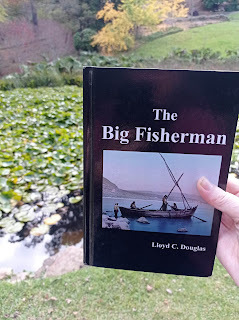
It was a calm, early summer noon in the southern mountains of Arabia. Sheltering the King's well-guarded domain, a mile above and a dozen miles east of the Dead Sea, motionless masses of neighbourly white clouds hung suspended from a remote blue ceiling.
There had been an unusually heavy snowfall in the winter, not only upon the King's land but throughout the country. It was going to be a prosperous season for everybody. Intertribal jangling and discontent would be reduced to a minimum.
MY THOUGHTS:
This was the bestselling fiction title of the year 1948. The eponymous character is, of course, the Apostle Peter, who booms off the page with huge stature and forceful personality. It tells the Gospel story with himself as the focal point, and I appreciate the inner grappling of Peter's mind every step along the way, from his first reluctant venture, as Simon the fisherman, to hear the noteworthy young Carpenter speak, to his passionate leading of the brand new faith movement. The bits concerning tussles with his own ego, in the face of Jesus' total indifference to social status or fame, are especially fun. Considering my current quest, (singling out the bestseller for each year throughout a century), I've got to grin.
Their first face to face encounter is among my favourite passages.
'By comparison with Simon's height and bulk, the Carpenter was of slight physique; but something about him, emanating from him, made him a commanding figure. Simon sensed it and felt inferior. In point of years, the man was his junior. Every other way considered, Simon felt himself a mere awkward, overgrown boy. He looked down into a pair of tranquil, steady, earnestly inquiring eyes. They held him fast; they brightened with a friendly smile, almost as if two long-time companions were meeting after a separation.'
But the big fisherman is not the only main character. It's also about the Arabian Princess Fara, the offspring of a marriage of convenience gone horribly haywire. Fara is a fictional character (I think!) but her parents' ill-fated union is recorded in history and woven into this storyline. As a young man, Herod Antipas marries Phasaelis, known as Arnon in this book, daughter of Aretas, King of the Arabs. It's a political alliance intended to strengthen the might of both countries. But when the threat from Rome turns out to be not as dire as first feared, Antipas divorces Arnon and sends her home, since she cramps his style. By our modern standards, the dude did far worse things than that down the track. (And hey, at least he didn't pull a Henry VIII move and execute her.) I almost feel he does her a favour, since she's miserable and homesick. But those ancient Arabians were a fierce, proud people who instantly put Antipas on their hit list for what they perceive as a national snub.
No-one is more bitter against Antipas than Fara, his attractive daughter who has never met him but blames him that she feels like an outcast. For some reason, she assumes assassinating her biological father will change all her hang-ups. As Fara heads to Israel intending to commit the gruesome deed, her destiny is tangled with Peter's, and she's drawn along with him to the compelling teaching of the charismatic Carpenter.
And in yet another thread, anxious Voldi, the handsome young hunk who's in love with Fara, is hot on her heels. Although he ticks all her boxes, she refuses to marry him, since she considers herself a liability to him. Voldi would do anything to change Fara's mind.
As you can imagine, this is the sort of epic you begin without knowing when you'll come out the other side. It feels drawn out toward the end, because the story extends far beyond Jesus' Crucifixion to some of the events in Acts, and hints that the end occurs shortly before Peter's own death.
Douglas often uses poetic license, which can be cool in story retellings. But I guess the main peril of reading fiction based strongly on biblical scripture, or any history at all, is that lines may be blurred. Joseph of Arimathea is cast in the role of the rich young ruler, which works in this story but most likely wasn't him at all. The healing miracles are great, but written in a way that suggests each one seriously saps Jesus' strength. Nothing in Scripture supports this. Sure, he sometimes got exhausted, but from hours of strenuous, non-stop work, rather than any individual acts. I do get Douglas' good intentions to show that every burden Jesus lifts from anyone is taken on himself, foreshadowing the tremendous gesture of the Crucifixion. Yet at the same time, promoting the idea that healing people completely drained him undermines Jesus' position of power and authority.
If we compare this epic against record, a few great Peter moments go begging. There is no Transfiguration incident in this book, and no mention of the crowing rooster during his big moment of shameful grief. Nor is there any scene with Peter rushing to the Tomb directly after hearing the women's report that it was empty.
As for Fara's thread, it sputters out all of three ways; regarding her father, Voldi and her future. I won't move into plot spoilers, but in both factual and fictional storylines, several dramatic incidents it seems logical to include were either glossed over or occurred offstage. After investing so much time into this massive book, that was disappointing. Some readers may feel that since this tome is well over 500 pages, Lloyd Douglas couldn't include everything. But I contest that some of the bits he did retain could've easily been sacrificed for the sake of the super-duper, mind-blowing bits he missed out.
Overall, there are many touching, convicting, breathtaking moments that make it well worth pushing through. I was pleased to see these words put into the mouth of Gamaliel, legal council to the lawgivers. 'Give these infatuated Galileans time. If their cause is unworthy of regard it will perish. If it is inspired of God, as they insist, you will not be able to thwart it even if you would.'
Ranking it is a challenge. The convicting, power moments definitely deserve five stars, yet the sketchy or missed parts undeniably cheat readers of the action we have every right to expect. And although I enjoyed the book, I was glad to turn the final page.
🌟🌟🌟
May 24, 2023
More Mini Reviews
The Greengage Summer by Rumer Godden
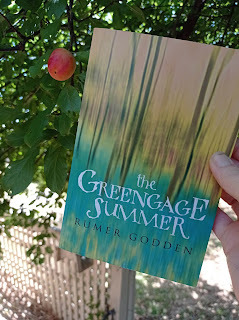
The five Grey kids, Joss, Cecil, Hester, Willmouse and Vicky, were each born three years apart, ranging in age from 4 to 16. They barely know their absentee botanist father, who only returns from international fieldwork once every three years. (Do you sense a pattern?) One summer, their mother decides to take them to the battlefields of France to imbibe the history of great sacrifice. Yet she ends up in hospital suffering from a dangerously infected horsefly bite. Meanwhile, the kids are left at loose ends at their hotel, Les Oeillets. A fellow guest, Mr Eliot, offers to take charge of the quintet, and Mother agrees based on first impression, without thinking to check his credentials. Hmm, our readers' suspicion antennae are set twitching.
It's partly a coming-of-age story. The narrator, 13-year-old Cecil, is quietly disgruntled because her beautiful 16-year-old sister Joss is making such an impression on Eliot. Cecil's tweenie desire to be special is always in conflict with her desire not to stick out. She wants to be unusual, but whenever anyone suggests they already are, she feels indignant and embarrassed.
It soon becomes clear there's a mystery concerning their friend Eliot, but the kids aren't sure they want to clear it up, since his handy charisma has worked on each of them, and they love him.
The distinct and quirky personalities of characters gives this story its charm. Not just the Grey siblings but the hotel staff too. I love it that meticulous7-year-old Willmouse, the only boy in the family, aspires to become a fashion designer. I also like perceptive Cecil's comments. For example, 'It was odd that we, who had never seen elegance before, immediately recognised it.' And I appreciate the sensual and vivid descriptions of the French summer, including the greengage plums which are alluded to in the title.
My main reservation is whether Godden tries to make the story too dramatic at the end by adding murder to the plot. It was really unneccesary, since there is already crime enough for a book which is more of a reflective ramble than an eventful potboiler. It seems melodramatic, doesn't really fit the tone, and is a shame, considering the character who is sacrificed. Oh, and there's also too much untranslated French. Godden takes after Charlotte Bronte here, but in the most annoying way.
🌟🌟🌟
Ballet Shoes by Noel Streatfeild
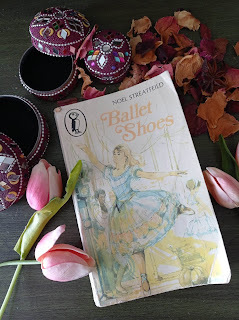
Meg Ryan's character Kathleen Kelly from the movie 'You've Got Mail' strongly recommended this charming kids' classic from 1936. I picked up this old Puffin from a secondhand book sale for the sake of the memories.
It's about the three adopted Fossil sisters who make a pact to make their name count, and get their start in the performing arts. Pauline is great at putting on other people's characters like garments. Little Posy is clearly born for dancing. Petrova, the middle sister, would prefer to be wearing overalls and tinkering with engines but gets swept along with the family stage passion anyway.
I enjoyed it as a sturdy, uncoordinated little girl, when it gave me aspirations to learn drama and dancing, which never amounted to anything. I found it an okay read when I revisited it recently. Alas, I'd forgotten about poor Winifred, the most talented student in the school of performing arts. But she misses out on the best roles even though she aces auditions because she lacks Pauline's classical beauty. Winifred has a 'clever, interesting looking face' and straight, mousy brown hair, but this never quite cuts it.
Noel Streatfeild doesn't shy away from life's injustices. She reveals a shallow and demanding industry that requires a performer's heart and soul. Somehow, this actually comes through without losing any of the vintage charm of the story. But it sure doesn't make me inclined to track down the rest of the 'Shoes' series, and I was surprised to discover there are 11 spin-offs. Some people must've loved them. Based on this first, which is said to be the very best, I wasn't one of them.
🌟🌟🌟
Absent in the Spring by Mary Westmacott
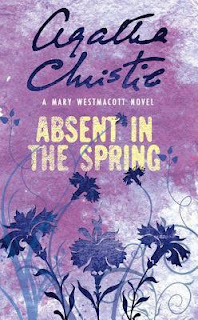
I'm assuming it's general knowledge that Mary Westmacott was the pseudonym Agatha Christie used when she wanted to try her hand at a different genre than mystery. This is said to be Dame Agatha's personal favourite Westmacott title. When I read that on the Christie website, I got hold of the e-version offered by my state library.
Christie/Westmacott was eager to delve into the confronting question of whether we tend to view ourselves with far more affection and lenience than we really deserve. What if others see our true colours, and regard us as huge hassles in their lives? What if, in our comfy habit of thinking well of ourselves, we're clueless about what's really going on?
She explores the theme through Joan Scudamore, a self-satisfied, middle-aged wife and mother. Joan's husband, Rodney, is a successful lawyer and their three adult children were all smart kids with nice manners which she took credit for. So Joan is stranded in transit for a short time between London and Baghdad, where she'd been helping her daughter, Barbara, through a brief illness. At first Joan is thankful for the opportunity to simply rest for a few days, but the stillness of the desert railway siding hotel starts playing havoc with her nerves.
As memories and nostalgia filter through her mind, Joan begins to wonder whether she's a busy-body, control-freak and trouble-maker who others simply tolerate and secretly blame for stamping the passion out of their lives. Once the train gets moving she's thankful to escape her morbid imagination and resume life as normal.
But were her misgivings really imaginary? Cue the eerie music! Something like reverse gaslighting is taking place. Rather than telling her clearly and honestly when she oversteps the mark hundreds of times, Joan's family members find it easier to let her drift on in her oblivious domestic paradise. Since they're colluding in a collective copout, perhaps it's partly their own fault that she makes them feel wretched. I have little respect for Rodney, Tony, Averil and Barbara for quietly resenting Joan behind her back all those years to avoid some short term discomfort. Having said that, they probably know her well enough to sense that honesty would be ineffective. Yet they never once put it to the test within these pages. This is not a pleasant read but quite an interesting one.
🌟🌟🌟
May 17, 2023
'A Tangled Web' by Lucy Maud Montgomery
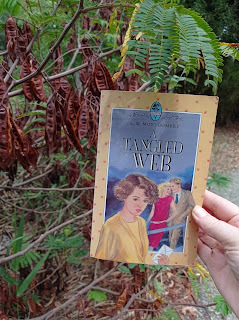
Over the years sixty members of the Dark family and sixty Penhallows have married one another—but not without their share of fighting and feuding. Now Aunt Becky, the eccentric old matriarch of the clan, has bequeathed her prized possession: a legendary heirloom jug. But the name of the jug's new owner will not be revealed for one year.
In the next twelve months beautiful Gay Penhallow's handsome fiancé Noel Gibson leaves her for sly and seductive Nan Penhallow; reckless Peter Penhallow and lovely Donna Dark, who have hated each other since childhood, are inexplicably brought together by the jug; Hugh and Joscelyn Dark, separated on their wedding night ten years ago for reasons never revealed, find a second chance—all watched over by the mysterious Moon Man, who has the gift of second sight. Then comes the night when Aunt Becky's wishes will be revealed...and the family is in for the biggest surprise of all.
MY THOUGHTS:
Plain-spoken Aunt Becky Dark, aged 85, knows she's soon to die, and that all her relatives long to inherit her valuable antique jug - a Georgian monstrosity covered with mawkish pictures and poetry. She holds a clan gathering, ostensibly to reveal who will inherit it, but in reality to taunt her extended family and rouse their spite and envy against each other.
Several subplots are brewing among the guests in her parlour, which somehow manage to sort themselves out in the aftermath of the party. To mention just a few, Hugh and Joscelyn Dark were married years ago, but she ran out on him on their wedding night and nobody knows why. Peter Penhallow and Donna Dark, who always hated the idea of each other, experience an odd attraction when they're finally face to face. Young Gaye Penhallow is brimming over with passion for her playboy boyfriend Noel, oblivious that trusty family doctor Roger is also quietly in love with her. And Big and Little Sam, who have lived amicably together for decades, have a major falling-out over a prize statue that gets delivered to their door.
Montgomery is one of my favourite authors, yet sometimes she misses the mark for me. I get the feeling we're meant to admire Aunt Becky as a canny straight-shooter, but I just find her a spiteful old trouble-maker. Putting pompous people in their place with a few well aimed home truths is one thing, yet she kept having vicious digs at hapless relatives for no other reason than total public humiliation. Nobody deserves the sort of demeaning treatment she puts them through. Perhaps it serves them right, in a way, for not staying home and indirectly telling her, 'You know what you can do with your tacky jug!'
At this stage, 1931, Maud had been writing long enough to recycle several of her favourite conventions and passages. She really had a thing about large eyes being beautiful. In her world, nobody with small or puffy eyes could ever be regarded as desirable or romantic. Little Brian Dark's plight has strong echoes of Hilary Gordon's, Nan Penhallow is a similar style smug cousin to Valancy's cousin Olive and Jane's cousin Phyllis. And Penny Dark's cats have the same names as Andrew and Jane Stuart's; First and Second Peter. Talking about cats, they tend to come to sad ends in Montgomery's fiction, and poor little Cricket is no exception. Finally, Gaye thinks, 'If I were dead and Noel came and looked at me, I would live again,' which is the exact same line Ilse Burnley uses about Perry Miller at the end of Emily's Quest.
The back cover blurb of my edition says, 'What happened at the party, and what happened because of it is described by L.M. Montgomery at her humourous best.' Nope, I beg to differ. So many of the scenarios were pathetic rather than funny. Joscelyn wasted such a slab of her life over reactive silliness! Aunt Becky's wit erred on the side of cruelty. Peter and Donna were a tad melodramatic. Gaye's situation was predictable from the get-go. The antics of the two Sams were slapstick in a crass way. And the final paragraph, delivered as a remark by Big Sam, is surely a contender for most tasteless ending of a classic novel. I liked Aunt Becky's obituary which she wrote for herself, that shocked her clan, but that's about it.
I tend to wonder if Montgomery really had her heart in this project. It feels as if she was just going through the motions, stitching together a patchwork story by recycling work she'd written before.
🌟🌟½
May 10, 2023
'Pollyanna's Jewels' by Harriet Lummis Smith
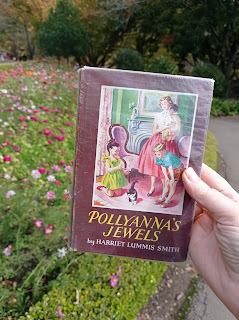
MY THOUGHTS:
The setting for this domestic action is Elsinore Terrace, a friendly street in 1920s suburban Boston where neighbours mingle. Jimmy and Pollyanna settle down in a house there with their growing family. They have Junior, who was born at the end of Pollyanna of the Orange Blossoms; Judy, a beautiful child with the black curls her mother always dreamed of; and the sunny baby whose name is never divulged in this book. (It's Ruth, as we find out in later books.) And Nancy lives with them as their only household servant. She considers them her closest thing to family, now that her husband, Timothy, has passed away. I figure he can't have been very old. I guess he died of fatal plot device, same as Dr Chilton.
There is a small outsider named Philip who lives with his parents in an unvisited house. They each left their former spouses and since he is the offspring of adultery, nobody is allowed to play with him. Pollyanna and Jimmy pity Philip but never encourage him lest they alienate their own kids in the eyes of the neighbourhood. This attitude strikes me as pretty harsh coming from Jimmy, considering his own personal history of being an outcast at Philip's age. I would've liked to see him urge his children to champion the underdog, but I guess this just proves the power of social pressure. This thread works itself out in a fairly brutal, dare I say convenient fashion.
Another neighbour is Mildred Richards, the young mother who chooses to work outside of the home for 'self expression' even though her husband can easily support her. She's a joint proprietor of a gift shop, and she and Pollyanna often lock horns over the stay-at-home-mother debate. Pollyanna makes a fair point when she remarks that drudgery exists in every line of work, including retail, but so does Mrs Richards when she says that some women feel trapped and squandered by being forced to fit the one single mold society dictates for them. (Remember, this is the 1920s.)
I sense the author, Smith, is agenda driven, biased to Pollyanna's point of view even though the debate is still so un-clear-cut it's raging to this day. I would've preferred her to write more dispassionately rather than foisting her opinion upon readers, since there are valid points to be made for both sides. After all, since Pollyanna is quick to say she's done all the things she ever wanted to, I guess she should allow Mrs Richards the same freedom.
Another bugbear is the Aunt Polly factor, which drove me crazy. She sells the big Harrington house in Beldingsville, accepts an invitation to live with Pollyanna and Jimmy, then tries to run the place! The narrator remarks that Polly finds it hard to come to terms with the fact that 'she's no longer captain of the craft in Pollyanna's house, but merely a passenger.' I wanted somebody (other than poor Junior) to call her an overbearing control freak to her face, but Jimmy wasn't allowed to and Pollyanna snatched the perfect opportunity to wimp out. It's a pity so many Aunt Pollys of the world are free to juggernaut their way through life, oblivious of the havoc they cause, just because others are too spineless to tell them when they've overstepped. This case is no exception. Arrgghh!
But as always, Pollyanna and Jimmy's relationship gets a big thumbs up. They are best friends as well as spouses. Chapters often finish with Pollyanna chattering to Jimmy about what happened during the day, to which he responds with some witty wisecrack. Since he really is funny, I like it.
(Oh, and in other family news, the huge secret at the end of Pollyanna Grows Up is accidentally revealed to Jamie, and the you know what really hits the fan. But I guess this happens around the stage when Jimmy would have been free to open his envelope anyway, even if he hadn't done it about ten years prematurely. He and Pollyanna must be nudging thirty by now. Talk about awkward though. Especially between the two guys, who have had close relationship forced upon them in the weirdest way. I guess we'd have to call them stepbrothers by marriage.)
Skimming over this review, I feel I ought to knock off one star because of the gripes I've aired, but don't get me wrong. I still had great fun reading this book, and hope it shows.
Next up will be Pollyanna's Debt of Honour.
🌟🌟🌟🌟
May 3, 2023
'Sparkling Cyanide' by Agatha Christie
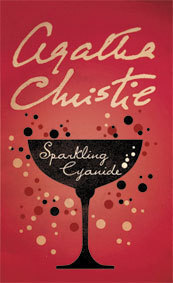
MY THOUGHTS:
Six months before this story starts, beautiful Rosemary Barton was celebrating her birthday with a select table of loved-ones when she dramatically collapsed and died. Cyanide was discovered in her champagne. The police verdict was suicide, since nobody had the apparent means of tampering with Rosemary's glass. What's more, a packet containing cyanide crystals was found in her handbag.
But now Rosemary's husband, George, has received two anonymous letters declaring that it was murder. He's determined to get everyone back around the same table at the hotel to set off a psychological trap and get to the bottom of it.
The other five guests are understandably uneasy to receive their invitations. Not only is George's proposal a bit creepy, but each knows deep down that he or she had a private reason for wanting vivacious, harmless Rosemary dead. Agatha Christie introduces each person's background tale of how they could benefit from Rosemary's death. They also reveal Rosemary herself to be an empty-headed seductress with the potential to seriously irritate people, depending on their personal triggers.
The premise that poor Rosemary invited the wrong circle of friends to her intimate birthday party is chilling. So is the fact that they are all 'nice' people. Christie suggests that maybe, given the perfect alignment of timing and hatred, every person is capable of murdering just one other person in their lives. Especially since in each case, their hatred or resentment of Rosemary is based on their own selfish agendas, for she herself was never essentially evil. 'A lovely creature with the brains of a hen,' according to her illicit lover.
So was it Ruth Lessing, George's immaculate secretary who would go above and beyond for her employer?
Or either Stephen or Lady Alexandra Farraday; the political whiz kid who Rosemary loved and his elegant, self-contained wife?
Or Anthony Browne, the clever young man with a vague job in some armaments firm, whose past will not necessarily bear scrutiny?
Or Iris Marle, Rosemary's younger sister who's just about to celebrate her 18th birthday, and who is next in line to inherit a family nest egg after Rosemary's death?
George and all the others get way more than they bargain for at his awkward reunion night, and it makes the crook's slippery trail even harder to follow. The brains behind solving this crime are Colonel Race and Inspector Kemp - with surprise help from one of the guests present on both occasions.
As always, I enjoy discovering wise Christie philosophy within the pages of her novels which isn't crime related. This time I zoomed in on this dialogue between Anthony and Iris, while they're talking about Stephen Farraday. Do you think he has a point?
Iris: He always seems to me rather pompous and stupid.
Anthony: He's not at all stupid. He's just one of the unhappy successes.
Iris: Unhappy?
Anthony: Most successes are unhappy. That's why they are successes. They have to reassure themselves about themselves by achieving something the world will notice.
Iris: What extraordinary ideas you have, Anthony.
Anthony: You'll find they're quite true if you only examine them. The happy people are failures because they're on such good terms with themselves that they don't give a damn. Like me. They are also usually agreeable to get on with - also like me.
It's a great read that kept me turning the pages and guessing. It may be one of my favourite Christie mysteries thus far, and only a few niggles keep me from giving it five stars. Everyone was so quick to assume suicide at the outset, but I can't believe it would ring true to them that Rosemary would choose such a disfiguring and 'uglifying' method in front of her friends and family, rather than the seclusion of her own bedroom. Also, surely some of the others would decline George's second invitation, even though it was ostensibly for Iris's eighteenth birthday. Come on, they all had a perfect right to play the, 'It's too close to home and distressing,' card without appearing at all suspicious. I find it a stretch of credibility that not one single person played it.
🌟🌟🌟🌟
April 19, 2023
'Spare' by Prince Harry
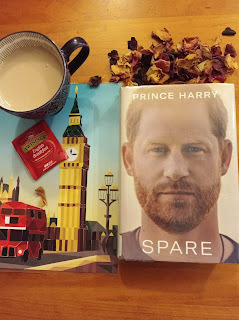
For Harry, this is that story at last.
MY THOUGHTS:
I was surprised it was only a two-month wait for 'Spare' to arrive at my local library for me. I'd expected far longer as this is undoubtedly the bestselling non-fiction title of 2023. There's a fast turnover, as I needed to get stuck straight into it, to return within two weeks. It took every day of that fortnight, since it's quite a chunky book with lots to take in.
Anyway, since the whole world has been shamelessly gawking and commenting about Prince Harry's life, I understand why he chooses to use the platform he never asked for to set the record straight. He says, 'I savoured normality, wallowed in it. For the first time I was just a name. Is this what other people feel like every day?'
Harry first reveals himself as that 12-year-old boy who was denied the right to process his intense and sudden grief privately. 'I reached for my father's hand and then cursed myself because that gesture set off an explosion of clicks.' His mother's tragic and untimely death is the frame on which many of Harry's subsequent reminiscences hang. His experience, especially in those first few years after Diana's death, suggests that grief is a personality changer. After that pivotal event in his life, he couldn't sit still in a contemplative frame of mind or attempt to quietly read a book, because those moments were when the grief gremlins attacked him. We'll never know if he would have faced the world with a more peaceful mindset had she lived, for that trajectory was closed for poor Harry. It makes very poignant reading, especially whenever he refers to Diana's 'disappearance' rather than her death. He admits that a certain element of denial helped see him through, whether or not others may have considered it healthy.
Nobody can dodge the controversial 'Spare' issue after which he named his book. Okay, as a fellow youngest sibling, I get where Harry is coming from. Being born last is in itself a trial. You grow up feeling marginalised and often find yourself a source of jest while the others watch you process things they've had several extra years to get a handle on. That all comes as part of the territory with Harry too, but with the additional gripe of feeling that who he was (the Spare) is a by-product of who he wasn't (the Heir). It's not a simple matter of being miffed because William had a bigger bedroom in the palace but a fact of life that cuts at his whole personhood. Other reviewers have scoffed at Harry's feelings, but whether or not we consider him a bellyacher, they are his feelings.
For the bulk of his book, I greatly admire Harry. We have no idea how it must feel to be ever on your guard, second-guessing how every innocent gaffe might be re-shaped by the predatory 'paps' to present to the world. We know nothing of the 'fancy captivity' of a lifetime spent like this. Harry does his best to explain the bitter irony that's so galling to him; that the same unscrupulous vultures who twist the minutiae of his own life fail to keep the world informed about far more vital issues we all should know.
The parts other people have cherry picked were over-stated, as I'd expected. The flurry about the incident where he loses his virginity aged 17 is over in a passing sentence without any name mentioned. Come on folk, it isn't even an incident. The 'frostbitten todger' is hilarious, although admittedly I'll probably think of it whenever photos of William and Kate's wedding pop up, since that's when Harry suffered the painful ordeal. And as for mentioning his 25 kills in his military career, in Harry's own words, 'We were in a war, what did they think I was doing, selling magazine subscriptions?' Some people have mentioned possible repercussions on Archie, Lilibet and other children of Harry's down the track, but isn't the highly publicised fact that he was fighting in Afghanistan likely to call for care and discretion anyway? It's sad to think that he's being vilified for what is arguably a most sacrificial period of his life.
I found Harry to be refreshingly candid and vulnerable in his approach. He isn't a bit superior or self-obsessed. On the contrary, he admits to feeling way out of his depth from as far back as his Eton schooldays and confesses non-stop, internal self-criticism. He's frequently embarrassed by his titles, as he considers them so unearned. Harry has a compassionate heart for wounded war-heroes and sufferers of panic attacks and other mental health issues, as he's sadly been there. He's a hard-worker, an empathetic sounding board, a brave and skillful pilot and an admirable ambassador for disabled athletes. He's also a sensitive and loving husband and father, and has now proven himself to be a fascinating, erudite author too. (Okay, I know a lot of the polish comes from Harry's ghost writer, J.R. Moehringer, who deserves kudos for helping Harry discover his own compelling voice.)
It would have been a 5 star read for me, but I'm dropping one because of Harry's candid revelations about his brother, who he always calls 'Willy.' Heartfelt as they are, I flinched several times while reading them. I feel 'Harold' has crossed a line, placing 'Willy' in an awkward, no-win situation. Responding in kind, with a 'just for the record...' style approach is not an option for the future monarch, without using the sort of public pettiness his family has always stood above. Yet by keeping silent, William is consenting to being regarded by many as the petty prat who threw a hissy fit when his brother was allowed to retain his beard for his own wedding, to mention just one example. It seems the Spare wields a sort of freedom after all, in his regretful tell-all which the Heir could never get away with.
I suspect what we get between the brothers is terribly biased and one-sided, as conflicts always are. Harry's side is clear and sincere as far as he can tell, yet Willy's side is bound to be completely different and equally compelling from his own point of view. The assumptions Harry makes, although completely true in his own eyes, may be far from the truth as his brother sees it. (For example, Harry assumes William is responding to the press when he calls Meghan rude and abrasive, but who's to say William doesn't feel himself to be perfectly justified and speaking from personal experience?) Harry arguably leaves William no other recourse than to resort to their Eton schooldays and pretend he doesn't know him. Although this book, Spare is the result of hours of painstaking work, there's a thoughtless, reactive vibe about some of it, particularly so many of the parts concerning William.
It's tragic to think this memoir might spell the end of the brothers' relationship. 'No one but Willy understood what it was like to live in this surreal fishbowl in which normal events were treated as abnormal and the abnormal was routinely normalised.' I'll bet if William were free to write his own memoir, it would be even more scorching in many ways, since the Heir surely bears burdens the Spare happily missed out on.
One of the most repeated and memorable quotes is King Charles', 'Don't read the news stories, darling boy.' That's Charles' default approach, and I tend to wonder if his darling boy's book is now up high among the literature he refuses to read. (I think our king comes across quite sympathetically for most of the book, except for him and Camilla making deals with the media to twist certain matters in exchange for portraying them favourably.)
Whew, my husband and kids are glad 'Spare' has now gone back to the library, as I'll stop talking to them about all this stuff. But I tend to regard this book as a generous revelation into a slice of history which anyone who keeps an eye on the Royals shouldn't miss. I'm sure it'll be up among my top 10 reads of the year. It's fantastically written and there's more I haven't even begun to discuss, including his relationship with other royals such as his grandparents (I would've liked to see more Prince Philip in these pages), his great Aunt Margaret (Aunt Margo), the Queen Mother (Gam Gam) and his Uncle Andrew, not to mention Meghan, the love of his life. But this review is long enough so I won't even go there.
Think of me when we're all hunkering down watching Charles' coronation.
🌟🌟🌟🌟
April 12, 2023
'Miss Garnet's Angel' by Salley Vickers
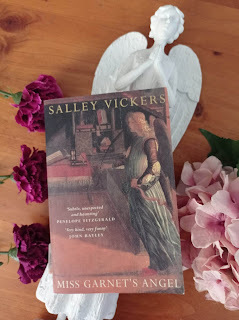
Stories magically unfold within this novel’s irresistible tale of Miss Julia Garnet, a schoolteacher who decides, after the death of her longtime friend Harriet, to take an apartment for six months in Venice. Soon overwhelmed by the sheer beauty of the city and its magnificent art, Miss Garnet’s English reserve begins to melt away. For the first time in her life she falls in love—with an art dealer named Carlo—and her once ordinary world is further transformed by a beautiful Italian boy, Nicco, and an enigmatic pair of twins engaged in restoring the fourteenth-century Chapel-of-the-Plague. Most affecting to Julia, though, is her discovery in a local church of panels depicting the ancient tale of Tobias and the Angel. As Julia unravels the story of Tobias’s redemption, she too strives to recover losses—not just her own but also the priceless painting of an angel that goes mysteriously missing from the Chapel along with one of the twins restoring it. His name is Toby. And Miss Garnet herself may prove to be an angel, but nowhere in this haunting, beautifully textured and multilayered novel is anything quite what it appears to be.
MY THOUGHTS:
I made a new year's resolution to read some of the books of the Apocrypha, because I'm unfamiliar with them, so I made a start with the strange and bizarre book of Tobit. In a nutshell, a righteous old man turns blind when sparrows poop in his eyes, then sends his son on a long journey to acquire some family funds they're entitled to. The Angel Raphael accompanies the boy on his travels, incognito. In the process, young Tobias catches a fish with astoundingly specific healing properties and acquires a beautiful wife with a history of accidental husband slaying. That unusual tale led me to this novel, because it's been on my shelf for a while and I knew it draws greatly from the old story.
Miss Julia Garnet is a pedantic retired school teacher with Marxist ideals. After the sudden death of her housemate Harriet, she decides to take a six-month holiday alone in Venice. Since she's not the sort of person who appreciates the opulent, iconic character of the Catholic church tradition it seems an odd choice of destination. Yet Venice rubs off on Julia, along with the hunch that there may, after all, be more depth to the world than the ho-hum, everyday sliver of life she's used to. The Apocryphal story of Tobias and the angel comes to her attention through artwork everywhere, and then to Miss Garnet's surprise, she finds herself caught up in an unfolding, modern counterpart of that ancient story.
Even though the premise sounded so ambitious and appealing, I found the modern parallel way too heavy handed and unsubtle. It is clear who each new character is meant to represent, and Vickers had to tweak her plot in all sorts of far-fetched tangents to pull off her analogy. What's more, Julia Garnet struck me as a tedious, woeful protagonist whose head space I kept wanting out of. She seems to be forever bumping into things and hurting herself, or second-guessing others in her dithery efforts to gauge their intentions towards her.
My favourite parts of the novel by far were the retellings straight from the Book of Tobit itself. Salley Vickers assumes the voices of the dad Tobit and son Tobias brilliantly, to the extent that I grumbled whenever we were back with Julia again, even though she's the main character. Yet if I hadn't read the book of Tobit just before reading this novel, they would've gone over my head.
Even here, I would've loved more about the awkward position of poor Tobias, the boy who'd been coerced to get betrothed to a girl whose inner demon had murdered seven new husbands on their wedding night as they attempted to consummate the marriage. How would you feel knowing you stood a fair chance of being number eight? Maybe the black humour of the original tale is unintentional, but I love how his new father-in-law admits he'd been preparing a spot for him in the family crypt as Tobias headed to Sarah's bedroom, basically admitting, 'I thought you were a goner, mate.'
At one point, Salley Vickers has Tobit say, 'I've come to see that bungling is what all of us do. Perhaps bungling is what we are here for.' That might be my best takeaway, since I feel she's sort of bungled her handling of the Book of Tobit, which doesn't lend itself easily to modern knock-offs. For example, the modern counterparts of Toby and Sarah are a young pair of supposed twins restoring an ancient Venetian church. That in itself is a highly unlikely stretch of credibility.
Julia Garnet undoubtedly softens and mellows as a character, yet all through she seems to be the same finicky spinster who insists on having tradesmen address her as, 'Miss' rather than 'Mrs' rather than just letting it pass. Still, I can't deny Vickers gave it a good try, resulting in something almost as bizarre as the original. I remained just curious enough to keep turning pages to find out how this modern mess of an adaptation would turn out.
🌟🌟
The Vince Review
I invite you to treat this blog like a book-finder. People often ask the question, "What should I read next?" I've done it myself. I try to read widely, so hopefully you will find something that will strike a chord with you. The impressions that good books make deserve to be shared.
I read contemporary, historical and fantasy genres. You'll find plenty of Christian books, but also some good ones from the wider market. I also read a bit of non-fiction to fill that gap between fiction, when I don't want to get straight on with a new story as the characters of the last are still playing so vividly in my head. ...more
- Paula Vince's profile
- 108 followers



